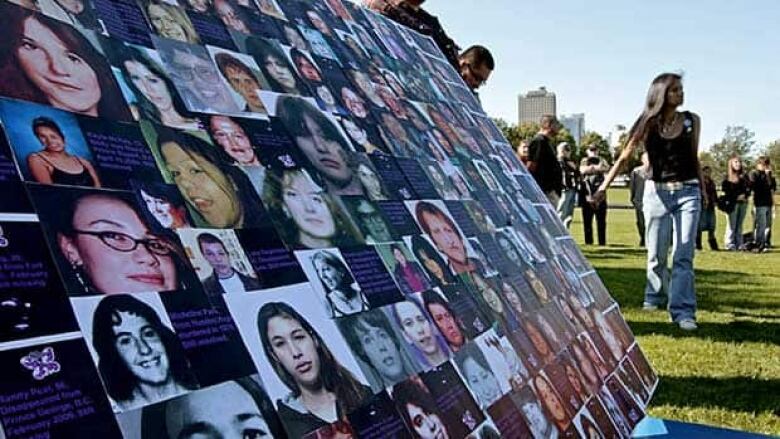Two more groups quit B.C. missing women inquiry

The public inquiry into the Robert Pickton case lost another two participants Thursday just days before it opens as two high-profile human rights groups quit over what they described as a flawed process that will shut out society's most-vulnerable voices.
Hearings are scheduled to begin next Tuesday as commissioner Wally Oppal investigates why police failed to stop Pickton as he hunted sex workers from Vancouver's Downtown Eastside.
The public inquiry has been overshadowed by controversy since it was announced, from the appointment of Oppal a former appeal court judge and Liberal cabinet ministeras commissioner, to theprovincial government's refusal to fund a number of non-profit advocacy groups despite Oppal's recommended they receive public money to pay for lawyers.
A growing list of groups have either formally withdrawn or publicly announced they won't be attending because of the funding decision, and the B.C. Civil Liberties Association and Amnesty International joined their ranks Thursday.
The two groups don't necessarily need the funding themselves. Amnesty International doesn't accept government money in any event, and the civil liberties association has participated in a number of lengthy and complex public inquiries and legal cases without such funding.
Withdrawing on principle
But both organizations said the government's decision to effectively shut out smaller non-profits such as drop-in centres for sex workers and First Nations groups has meant the process is irreparably broken.
"To participate in a process that is that flawed and to lend legitimacy to it, we decided was to contribute to a kind of injustice," Michael Vonn of the B.C. Civil Liberties Association told a news conference in Vancouver.
"Participants who were granted standing, in order to meaningfully exercise their standing, require counsel. There are something like a million documents to review in this. People who are given standing have the ability to cross-examine witnesses. You simply cannot do this without a lawyer."
Oppal recommended 13 participants and coalitions receive public funding to pay for lawyers at the inquiry, but the province only approved funding for relatives of Pickton's victims.
The commissioner lobbied the government to change its mind, saying it would be the "height of unfairness" to expect such groups to make submissions and question witnesses without lawyers when the police will be backed by well-funded legal teams.The province again refused, insisting it couldn't afford to spend the money.That has prompted a steady stream of those participants to withdraw.
Attempted compromise
Oppal attempted to fashion a compromise by appointing two independent lawyers whose role will be to represent the broad interests of Downtown Eastside residents and aboriginals.
They won't work directly for any of the unfunded groups, but will solicit their guidance in preparing questions and submissions. The reaction to those appointments has been mixed.
Some groups such as the Downtown Eastside Women's Centre have dropped outand said they will not work with the independent lawyers. However, other groups that have dropped out including the Frank Paul Society and the B.C. Civil Liberties Association still plan to consult with the independent lawyers.
Vonn said the additional lawyers won't be able to fill the void left by the participant groups.
"There's two of them," she said. "The imbalance here is absolutely clear. There is no comparison to say we have two lawyers, however capable, to represent the interests of groups who should be at the table, who the commissioner said are required to be at the table."
Premier urged to step in
A letter signed by most of the participant groups and many of the families of Pickton's victims last week urged Premier Christy Clark to step in and "fix" the funding decision, but Clark's attorney general has remained steadfast.
Shirley Bond insisted the two independent lawyers which will be paid for out of the commission's own budget and are not directly funded by the government will ensure the inquiry fulfills its mandate.
"One of the things we need to remember is that the inquiry process in B.C. is not designed to be a trial, and in fact, at public inquiries, legal representation is not required," Bond told reporters Thursday in Victoria.
"I'm disappointed, but I do expect that the commission will continue to do its work and will provide to the province some important decisions that will help us not to see this repeated in the province."
The provincial government will have its own lawyer at the hearings. The Criminal Justice Branch has hired prominent attorney Len Doust.
The hearings will examine why police failed to catch Pickton as they investigated the disappearance of sex workers in Vancouver in the late 1990s and early 2000s, as well as the decision by prosecutors not to charge Pickton with attempted murder after an assault on a sex worker in 1997.
Pickton was arrested in 2002 and eventually convicted of six counts of second-degree murder. The remains or DNA of 33 women were found on his farm in nearby Port Coquitlam, and he bragged to police that he killed 49.
Oppal recently held hearings in northern B.C. as part of a less-formal study commission, examining broader issues surrounding missing and murdered women, including cases along the so-called Highway of Tears.












_(720p).jpg)


 OFFICIAL HD MUSIC VIDEO.jpg)
.jpg)



























































































